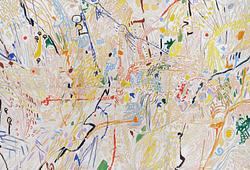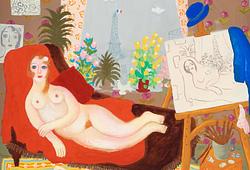Per Olof Ultvedt
"Saxar" from "Verk och verktyg"
Signed P.O. Ultvedt and dated 1967 on the reverse. Kinetic object, painted wood, electric motor. The wall plate/back piece measures 76 x 76 cm, with protruding moving parts. Includes 2 accompanying exhibition catalogs "Pentacle" at the Musée des Arts Décoratifs, Paris, 1968, and "P.O. Ultvedt: Tvivel och övermod - arbeten från 1945 till 1988", Malmö Konsthall 1988.
Alkuperä - Provenienssi
Acquired directly from the artist.
Muut tiedot
Made for the exhibition at Galleri Hedenius, Stockholm, "Verk och verktyg", 1967, possibly included.
Per-Olov Ultvedt was one of the strong and driving personalities who set art and Moderna Museet in movement during the notorious 1960s. With the famous exhibition "Rörelse i konsten" in 1961, together with the then director Pontus Hultén, the art educator Carlo Derkert and the engineer Billy Klüver, he transformed Moderna Museet into the center of events for just under three years, with the curious eyes of the whole world watching. Ultvedt participated with his mechanical and playful sculptures. He was never interested in the idea of art as something museum-like, created for eternity, but saw it as a process, a game or an action. He belongs to the generation of artists who broke with the old way of thinking of art. Many of his works have been built up over the years, only to disappear again. Labyrinths and moving machines have been built into exhibitions where they have amused, surprised, and evoked experiences in the audience. Of many of these works, only sketches and photographs remain.






























































